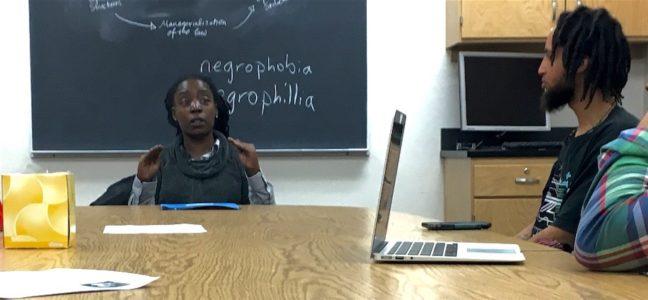As an end to a three-day lecture series, Shanara Reid-Brinkley, a visiting professor from the University of Pittsburgh, held an open forum Thursday to invite the public to discuss how black communities are able to move forward with political activism under “oppressive” white institutions.
The majority of the discussion focused on how — or if — white communities and black communities are able to work together in moving forward to create social change.
Jamala Rogers, who currently serves as the Activist-in-Residence at the University of Wisconsin’s Havens Center for Social Justice, spoke on activists’ role. With a civil rights career spanning multiple decades, Rogers’ most recent publication, “Ferguson Is America: Roots of Rebellion,” focused on her work with young activists during the Ferguson protests.
Activists have differing points of view when it comes to strategy, said Reid-Brinkley. She said one option is for the black community to “withdraw” from the rest of America and become self-sufficient.
Reid-Brinkley, however, said she does not consider herself a “withdrawalist,” or someone who believes the best way for the black community to strengthen itself is to become self-reliant. She believes in “strategic engagement” with the white community to get what the black community wants.
But when working with the black community, Reid-Brinkley said it’s important to note how white people interact with them. At times, Reid-Brinkley said white people exhibit a dichotomy of feelings of “negrophobia” and “negrophilia” toward black people.
“Negrophobia is what we’re talking about when people have anti-feelings toward black people,” Reid-Brinkley said.
White people may have a “fear response” toward black people, believing they are “ignorant” or “criminals,” Reid-Brinkley said.
On the other hand, white people may respond in the complete opposite way, Redi-Brinkley said. “Negrophilia” refers to this type of response.
“Negrophilia” helps explains why the white community enjoys hip-hop music or wants to have “that one black friend,” Reid-Brinkley said.
“[In America], there is both the phobic and philia response. We are both feared and desired. We are both hated and wanted,” Reid-Brinkley said.
Several audience members, including UW graduate student Shelby Rogers, wanted to know how mentors for the youth in the black community could make changes in their individual lives to further assist the black community in America.
“How do we ignite this level of passion within students so they understand their situation?” Rogers said.
One way institutions can help advance black students, Reid-Brinkley said, is by employing more black teachers to reflect the demographic. But Reid-Brinkley said insufficient pay for teachers creates a barrier there.
Engaging material will also help students feel more passionate about education, she said.
For future generations, Reid-Brinkley hopes both the white and black communities can live together cooperatively in the United States.
“We’re all Americans,” Reid-Brinkley said.


